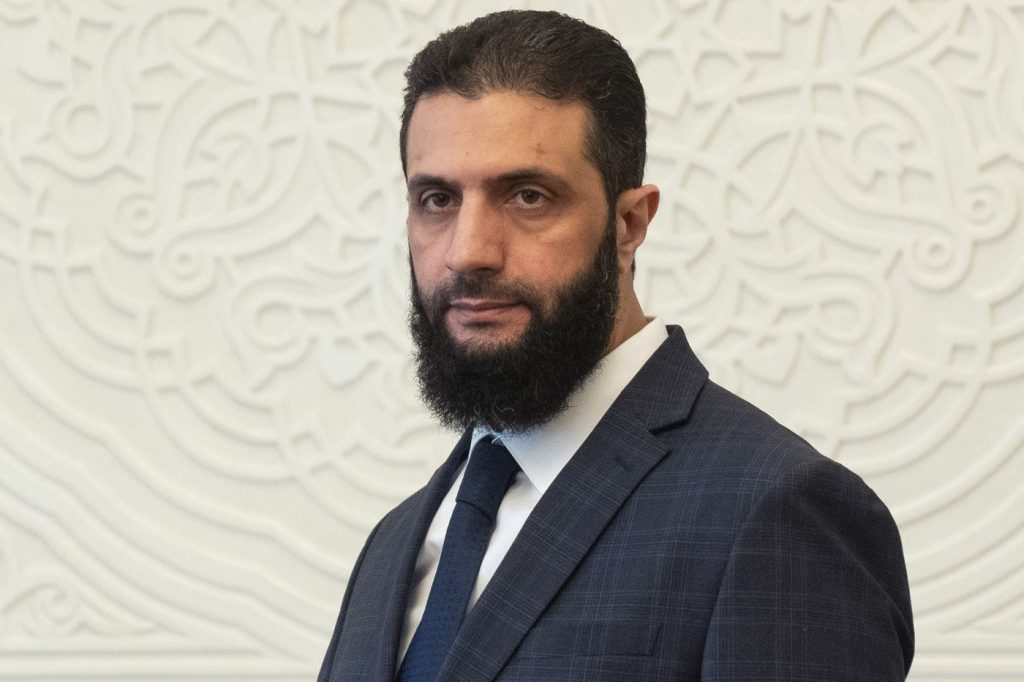DUBAI, United Arab Emirates (AP) - Ahmad al-Sharaa, Syria's interim president, made his inaugural trip abroad on Sunday, traveling to Saudi Arabia. This visit is perceived as a strategic pivot for Damascus, signaling a potential move away from its longstanding alliance with Iran.
Accompanied by his government's foreign minister, Asaad al-Shaibani, al-Sharaa arrived in Riyadh on a Saudi aircraft, with a Saudi flag prominently displayed. His appearance in Saudi Arabia marks a significant shift in the region's dynamics, as he is known internationally by the alias Abu Mohammed al-Golani, previously linked to al-Qaida.
The visit was highlighted by Saudi state television, emphasizing that al-Sharaa chose Riyadh as his first destination. Upon arrival, Syria's new three-star, tricolor flag was displayed alongside Saudi Arabia's flag at the airport. Al-Sharaa, dressed in a suit and tie, was set to meet with Saudi Crown Prince Mohammed bin Salman during his trip.
Historically, Saudi Arabia had invested significantly in various insurgent groups aimed at overthrowing former President Bashar Assad following Syria's 2011 Arab Spring protests, which led to a fierce government crackdown. However, these attempts largely failed as Assad, with substantial support from Iran and Russia, managed to stabilize his regime, leading to a deadlock in the conflict.
The situation shifted with a rapid offensive orchestrated by al-Sharaa's Hayat Tahrir al-Sham (HTS), a group which has severed its former ties with al-Qaida in recent years. Since then, al-Sharaa and HTS have been actively working on their public image, promoting a military persona reminiscent of Ukrainian President Volodymyr Zelenskyy, and seeking to foster connections with Syria's diverse populations, including its Christian and Shiite Alawite communities.
In an effort to recalibrate alliances, al-Sharaa's government has also distanced itself from both Iran and Russia. Currently, Iran has yet to reopen its embassy in Damascus, which had previously been central to its operations within what it termed the "Axis of Resistance," consisting of allies like Hezbollah in Lebanon. Russia, while eager to retain its military presence in Syria, faces a complex situation following its support for Assad during his period of instability.
These diplomatic maneuvers appear aimed at appealing to Western nations to alleviate severe sanctions imposed on Syria. The reconstruction of Syria, following over a decade of conflict, is anticipated to require hundreds of billions of dollars. The ongoing humanitarian crisis has left millions of Syrians in dire poverty, highlighting the urgent need for international aid and investment.
In January, Saudi Foreign Minister Prince Faisal bin Farhan visited Damascus, expressing that Riyadh is engaged in meaningful dialogue to lift sanctions against Syria. Unlike Turkey and Qatar, which have maintained close ties with al-Sharaa, Saudi Arabia has reestablished relations with Assad earlier in 2023, in line with a broader trend among Arab nations. Lifting these sanctions could substantiate the emerging alliance between Saudi Arabia and Syria.
Despite these developments, al-Sharaa's interim government continues to confront threats from the Islamic State group and other militant factions. A recent car bomb explosion in Manbij, Aleppo governorate, exemplified the ongoing violence in the region, resulting in the deaths of four civilians and injuries to nine others. The city had previously been captured by Turkish-backed Syrian rebels, highlighting the continued complexities of the Syrian conflict and the challenges facing the new regime.










